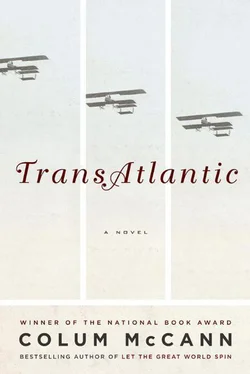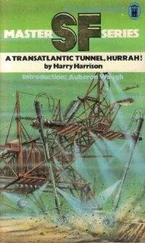— Come on and jump with us, mister!
The rope twisted and twirled in the air, slapped in a puddle, rose again, kicked up water drops as it twirled.
— Give us sixpence, will ya?
He was wary of the mud that already dotted his overcoat. He glanced down at his shoes: they would have to be cleaned.
— Please, mister!
— Ah, come on.
A boy spat on the ground and ran off. The girl coiled the rope, gathered the other children together, stood them at attention, instructed them to wave good-bye. A few stray youngsters followed the carriage until they fell away, hungry, tired, sopping wet.
The streets grew quieter the closer they got to Webb’s house. A man in a peaked blue hat walked along, firing up the streetlamps until they glowed, a small row of halos. The homes looked warm and soft.
The cold had insinuated itself into him. The damp, too. He knocked his boot against the seat to warm his toes. Douglass longed to be inside.
Webb sounded the horn on the front of the carriage. Within seconds the butler had opened the door and was running down the steps with an umbrella. The butler splashed through a puddle and went towards Webb, but Webb said: No, no, our guest first, our guest, please. There was an odd smell in the air. Douglass still couldn’t figure out what it was. Sweet, earthy.
He walked quickly up the steps with the butler in attendance. He was brought to the fireplace in the living room. He had seen the fire the night before, but had not noticed what it was: clods of burning soil.
HE CRAWLED OUT of bed to write Anna a note. He needed to be judicious. She could not read nor write, so it would be spoken aloud to her by their friend Harriet. He did not want Anna embarrassed in any way. My dearest. I am in polite and capable hands. My hosts are witty, convivial, open. The air is damp, yet there is something about it that seems to clarify my mind .
A loosening was taking place in his thoughts. Just the fact that he was not pursued, did not have to look over his shoulder, could not be whisked away.
On occasion I have to pause, astounded that I am not fugitive anymore. My mind unshackled. They cannot place me, or even imagine me, upon the auction block. I do not fear the clink of a chain, or crack of whip, or turn of door handle .
Douglass laid aside his pen for a moment, opened the curtains to the still dark. No sounds at all. On the street, a lone man in rags hurried along, hunched into the wind. He thought then that he had found the word for Dublin: a huddled city. He, too, had spent so many years, huddled into himself.
He pondered the possibility of his own living room: Harriet reading the letter aloud, Anna in cotton dress and red head wrap, her hands folded in her lap, his children at the edge of her chair, poised, eager, confused. I send you my unceasing love, Frederick .
He tightened the curtains, got back into bed, stretched his feet out over the end of the mattress. His toes extended beyond the bed. It was something humorous, he thought, to include in his next letter.
ON A TABLE, in neat piles, was the Irish edition of his book. Brand-new. Webb stood behind him, shadowed, hands folded behind his back. He watched Douglass intently as he flicked through and inhaled the scent of the book. Douglass paused at the engraving at the front, ran his finger over his likeness. Webb, he thought, had endeavored to make him look straight-nosed, aquiline, clear-jawed. They wanted to remove the Negro from him. But perhaps it was not Webb’s fault. An artist’s error maybe. Some fault of the imagination.
He closed the book. Nodded. Turned to Webb, smiled. He ran his fingers once more along the spine. He did not say a word. So much was expected of him. Every turn. Every gesture.
He paused, took a fountain pen from his pocket, let it hover a moment and signed the first book. For Richard Webb, In friendship and respect, Frederick Douglass .
A measure of humility lay in one’s signature: it was important not to flourish the pen.
I was born in Tuckahoe, near Hillsborough, and about twelve miles from Easton, in Talbot county, Maryland. I have no accurate knowledge of my age, never having seen any authentic record containing it. By far the large part of the slaves know as little of their ages as horses know of theirs, and it is the wish of most masters within my knowledge to keep their slaves thus ignorant .
AT THE BOTTOM of his traveling trunk he kept two iron barbells. Made for him by a blacksmith in New Hampshire: an abolitionist, a friend, a white man. Each of the barbells weighed twelve and a half pounds. The blacksmith told him that he had melted them from slave chains that had once been used in the auction houses where men, women, and children were sold. The blacksmith had gone around and bought all the chains, melted them, made artifacts from them. In order, he said, not to forget.
Douglass kept the barbells a secret. Only Anna knew. She had lowered her eyes to the floor when she had first seen them, but she soon grew used to them: first thing every morning, last thing at night. There was a part of him that still missed the days of carpentry and caulking: fatigue, desire, hunger.
He turned the key in the bedroom door, pulled the curtains across, locked out the light of the Dublin gas lamps. He lit a candle, stood in his shirtsleeves.
He lifted the barbells one after another — first from the floor and then high in the air — until sweat dripped down onto the wood. He positioned himself to watch himself in the oval looking glass. He would not become soft. It was exhaustion he wanted — it helped him write. He needed each of his words to appreciate the weight they bore. He felt like he was lifting them and then letting them drop to the end of his fingers, dragging his muscle to work, carving his mind open with idea.
He was in the fever of work. He wanted them to know what it might mean to be branded: for another man’s initials to be burned into your skin; to be yoked about the neck; to wear an iron bit at the mouth; to cross the water in a fever ship; to wake in another man’s field; to hear the jangle of the marketplace; to feel the lash of the cowhide; to have your ears cropped; to accept, to bend, to disappear.
It was his work to capture that through the nib of his pen. His billowy white shirt was covered in ink stains. At times, searching for words, he would hold the blotting paper to his forehead. Later, dressing himself for dinner — cravat, smoking jacket, cufflinks, polished shoes — he would glance in the mirror and find blue spots of ink smudged on his face. He was told by Webb that the Irish words for a black man were fear gorm , a blue man. He scrubbed his face, his hands, his fingernails. He looked at himself again in the mirror, lashed out, stopped short, his knuckles trembling at the glass.
He descended the curved staircase, stopped, bent down, shone the front of his shoes once more, using the wetted edge of a handkerchief.
The butler greeted him in the hallway. He could not for the life of him remember the man’s name, Charles or Clyde or James. A terrible thing, to forget a man’s name. He nodded to the butler, moved through the hallway, into the shadows.
Webb had hired a pianist to accompany the evenings. Douglass could hear the notes colliding in the air as he approached. He was fond of the standard fare — Beethoven, Mozart, Bach — but he had heard there was someone new, a Frenchman called Édouard Batiste who was said to be coming to Dublin to play. He would have to inquire: his life these days was much about having to inquire without exhibiting a lack of knowledge. He could not seem ignorant, yet he did not want to be strident either. A fine line. He was not sure where he could show weakness.
Читать дальше












